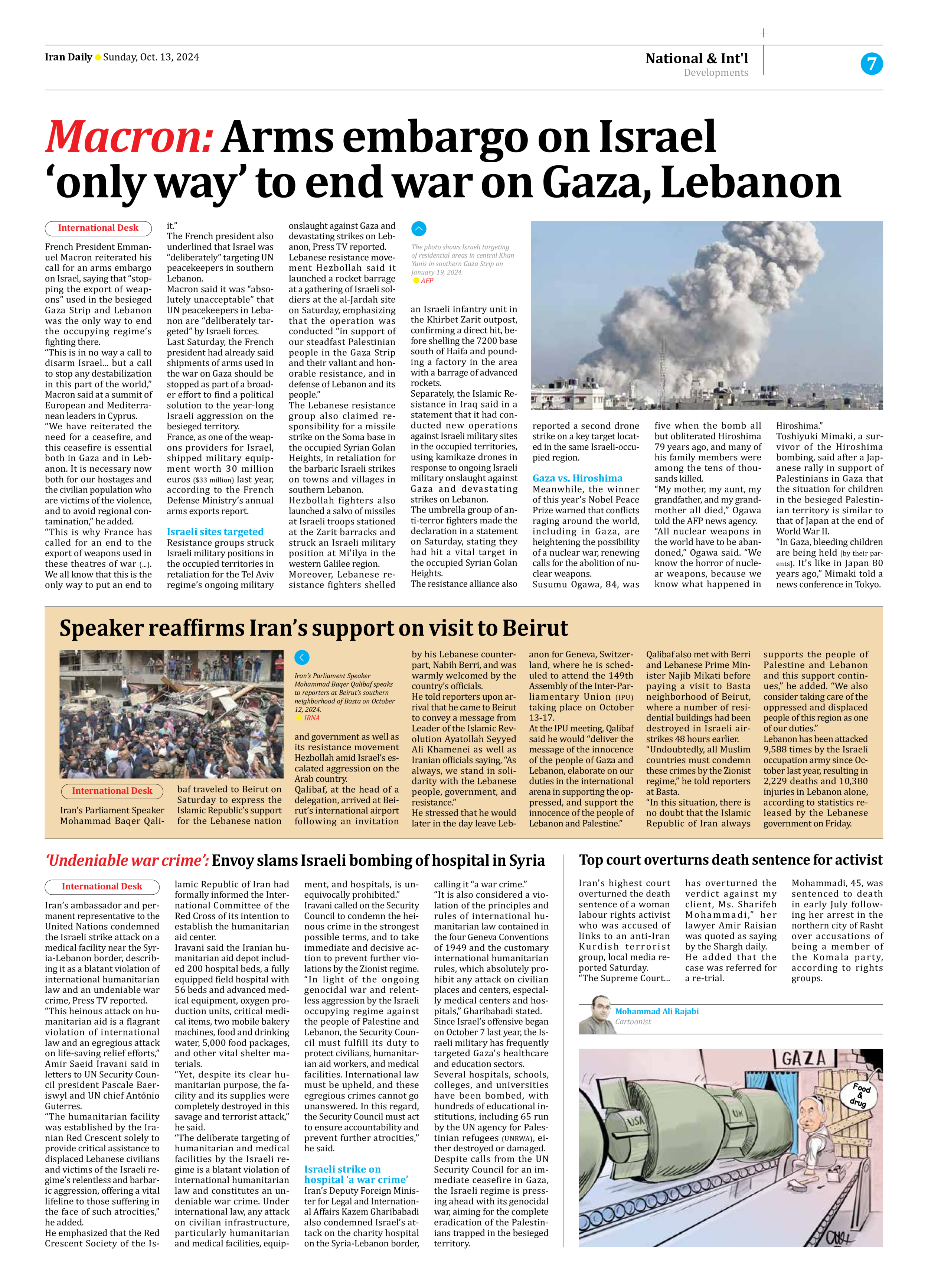
Macron: Arms embargo on Israel ‘only way’ to end war on Gaza, Lebanon
French President Emmanuel Macron reiterated his call for an arms embargo on Israel, saying that “stopping the export of weapons” used in the besieged Gaza Strip and Lebanon was the only way to end the occupying regime’s fighting there.
“This is in no way a call to disarm Israel... but a call to stop any destabilization in this part of the world,” Macron said at a summit of European and Mediterranean leaders in Cyprus.
“We have reiterated the need for a ceasefire, and this ceasefire is essential both in Gaza and in Lebanon. It is necessary now both for our hostages and the civilian population who are victims of the violence, and to avoid regional contamination,” he added.
“This is why France has called for an end to the export of weapons used in these theatres of war (...). We all know that this is the only way to put an end to it.”
The French president also underlined that Israel was “deliberately” targeting UN peacekeepers in southern Lebanon.
Macron said it was “absolutely unacceptable” that UN peacekeepers in Lebanon are “deliberately targeted” by Israeli forces.
Last Saturday, the French president had already said shipments of arms used in the war on Gaza should be stopped as part of a broader effort to find a political solution to the year-long Israeli aggression on the besieged territory.
France, as one of the weapons providers for Israel, shipped military equipment worth 30 million euros ($33 million) last year, according to the French Defense Ministry’s annual arms exports report.
Israeli sites targeted
Resistance groups struck Israeli military positions in the occupied territories in retaliation for the Tel Aviv regime’s ongoing military onslaught against Gaza and devastating strikes on Lebanon, Press TV reported.
Lebanese resistance movement Hezbollah said it launched a rocket barrage at a gathering of Israeli soldiers at the al-Jardah site on Saturday, emphasizing that the operation was conducted “in support of our steadfast Palestinian people in the Gaza Strip and their valiant and honorable resistance, and in defense of Lebanon and its people.”
The Lebanese resistance group also claimed responsibility for a missile strike on the Soma base in the occupied Syrian Golan Heights, in retaliation for the barbaric Israeli strikes on towns and villages in southern Lebanon.
Hezbollah fighters also launched a salvo of missiles at Israeli troops stationed at the Zarit barracks and struck an Israeli military position at Mi’ilya in the western Galilee region.
Moreover, Lebanese resistance fighters shelled an Israeli infantry unit in the Khirbet Zarit outpost, confirming a direct hit, before shelling the 7200 base south of Haifa and pounding a factory in the area with a barrage of advanced rockets.
Separately, the Islamic Resistance in Iraq said in a statement that it had conducted new operations against Israeli military sites in the occupied territories, using kamikaze drones in response to ongoing Israeli military onslaught against Gaza and devastating strikes on Lebanon.
The umbrella group of anti-terror fighters made the declaration in a statement on Saturday, stating they had hit a vital target in the occupied Syrian Golan Heights.
The resistance alliance also reported a second drone strike on a key target located in the same Israeli-occupied region.
Gaza vs. Hiroshima
Meanwhile, the winner of this year’s Nobel Peace Prize warned that conflicts raging around the world, including in Gaza, are heightening the possibility of a nuclear war, renewing calls for the abolition of nuclear weapons.
Susumu Ogawa, 84, was five when the bomb all but obliterated Hiroshima 79 years ago, and many of his family members were among the tens of thousands killed.
“My mother, my aunt, my grandfather, and my grandmother all died,” Ogawa told the AFP news agency.
“All nuclear weapons in the world have to be abandoned,” Ogawa said. “We know the horror of nuclear weapons, because we know what happened in Hiroshima.”
Toshiyuki Mimaki, a survivor of the Hiroshima bombing, said after a Japanese rally in support of Palestinians in Gaza that the situation for children in the besieged Palestinian territory is similar to that of Japan at the end of World War II.
“In Gaza, bleeding children are being held [by their parents]. It’s like in Japan 80 years ago,” Mimaki told a news conference in Tokyo.







